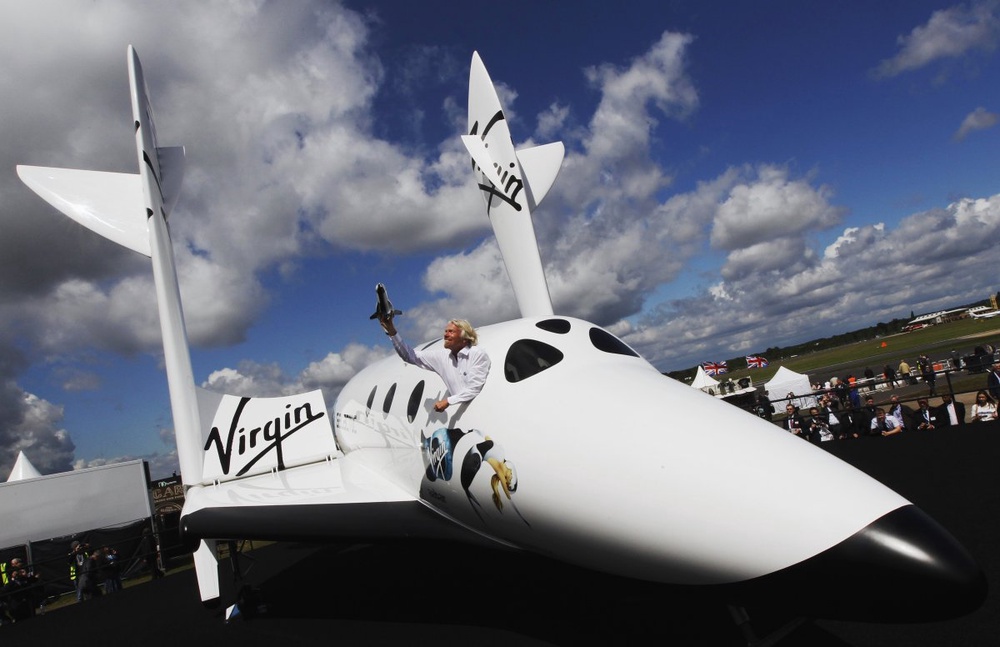
Virgin Galactic's passenger spaceplane, which is designed to take tourists to the edge of space, flew its first rocket-powered test flight Monday, breaking the sound barrier at high altitude, AFP reports. SpaceShipTwo ignited its engine after being released by WhiteKnightTwo, a plane that carried it to 47,000 feet (14,000 meters) above California's Mojave desert, British billionaire Richard Branson's firm said in a statement. The rocket burned, as planned, for 16 seconds -- enough to propel the spacecraft to 55,000 feet at 1.2 times the speed of sound, the statement said. "For the first time, we were able to prove the key components of the system, fully integrated and in flight," said Branson, who observed from the ground. He predicted the successful test would pave the way to "full space flight by the year's end." Next time, the company plans to keep the rocket going longer, to bring SpaceShipTwo to an altitude of more than 328,000 feet (100 kilometers), on the edge of space. During the rocket-powered flight, pilots Mark Stucky and Mike Alsbury commanded the SS2, which, after just 10 minutes, landed safely on the runway of the Mohave Air and Space Port, shortly after 8:00 am local time (1500 GMT). More than 500 people have already reserved seats -- and paid a deposit on the $200,000 ticket price -- for a minutes-long suborbital flight on SS2. Branson has also said that he'll bring his family on one of the flights to show his confidence in the safety of the spacecraft. SpaceShipTwo can carry six passengers. It is the commercial version of SpaceShipOne, the first private spacecraft to reach the edge of space in 2004, and which is now on displace at the National Air and Space Museum in Washington.





Virgin Galactic's passenger spaceplane, which is designed to take tourists to the edge of space, flew its first rocket-powered test flight Monday, breaking the sound barrier at high altitude, AFP reports.
SpaceShipTwo ignited its engine after being released by WhiteKnightTwo, a plane that carried it to 47,000 feet (14,000 meters) above California's Mojave desert, British billionaire Richard Branson's firm said in a statement.
The rocket burned, as planned, for 16 seconds -- enough to propel the spacecraft to 55,000 feet at 1.2 times the speed of sound, the statement said.
"For the first time, we were able to prove the key components of the system, fully integrated and in flight," said Branson, who observed from the ground.
He predicted the successful test would pave the way to "full space flight by the year's end."
Next time, the company plans to keep the rocket going longer, to bring SpaceShipTwo to an altitude of more than 328,000 feet (100 kilometers), on the edge of space.
During the rocket-powered flight, pilots Mark Stucky and Mike Alsbury commanded the SS2, which, after just 10 minutes, landed safely on the runway of the Mohave Air and Space Port, shortly after 8:00 am local time (1500 GMT).
More than 500 people have already reserved seats -- and paid a deposit on the $200,000 ticket price -- for a minutes-long suborbital flight on SS2.
Branson has also said that he'll bring his family on one of the flights to show his confidence in the safety of the spacecraft.
SpaceShipTwo can carry six passengers.
It is the commercial version of SpaceShipOne, the first private spacecraft to reach the edge of space in 2004, and which is now on displace at the National Air and Space Museum in Washington.


 +7 (777) 001 44 99
+7 (777) 001 44 99















































